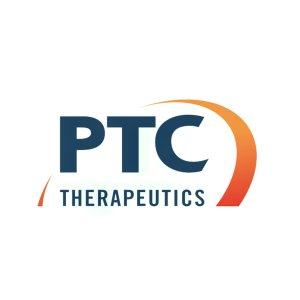PTC Announces Submission of Sepiapterin MAA for Treatment of PKU to EMA
- First marketing authorization submission for sepiapterin with additional global submissions to follow in 2024 -
"This MAA submission is the first in a series of global submissions for sepiapterin as we move closer to bringing this therapy to children and adults with PKU worldwide," said Matthew B. Klein, M.D., Chief Executive Officer of PTC Therapeutics. "The strength of the sepiapterin data generated in clinical trials substantiate how differentiated sepiapterin is from currently available therapies and support how sepiapterin could address the significant unmet medical need for PKU patients."
The sepiapterin MAA includes the results of the phase 3 APHENITY trial in which sepiapterin had a statistically significant and clinically meaningful reduction in blood phenylalanine levels in pediatric and adult PKU patients. Sepiapterin treatment resulted in a mean reduction in Phe levels of
PTC expects to submit the sepiapterin NDA to the FDA no later than the third quarter of 2024. Submissions in 2024 are planned in a number of additional key countries where PTC has existing rare disease commercial infrastructure including
About Sepiapterin
Sepiapterin (formerly PTC923) is an oral formulation of synthetic sepiapterin, a precursor to intracellular tetrahydrobiopterin, which is a critical enzymatic cofactor involved in the metabolism and synthesis of numerous metabolic products. Sepiapterin is a more bioavailable precursor than exogenously administered synthetic BH4 and has the potential to treat the broad range of PKU patients.
About Phenylketonuria
Phenylketonuria (PKU) is a rare, inherited metabolic disease, which affects the brain.1 It is caused by a defect in the gene that helps create the enzyme needed to break down phenylalanine.1 If left untreated or poorly managed, phenylalanine – an essential amino acid found in all proteins and most foods – can build up to harmful levels in the body. This causes severe and irreversible disabilities, such as permanent intellectual disability, seizures, delayed development, memory loss, and behavioral and emotional problems.1 Newborns with phenylketonuria initially don't have any symptoms, but symptoms are usually progressive, and damage caused by toxic levels of phenylalanine in the first few years of life is irreversible.2,3 Diagnosis of phenylketonuria usually takes place during newborn screening programs.4 There are an estimated 58,000 people with phenylketonuria globally.
About PTC Therapeutics, Inc.
PTC is a global biopharmaceutical company focused on the discovery, development and commercialization of clinically differentiated medicines that provide benefits to patients with rare disorders. PTC's ability to innovate to identify new therapies and to globally commercialize products is the foundation that drives investment in a robust and diversified pipeline of transformative medicines. PTC's mission is to provide access to best-in-class treatments for patients who have little to no treatment options. PTC's strategy is to leverage its strong scientific and clinical expertise and global commercial infrastructure to bring therapies to patients. PTC believes this allows it to maximize value for all its stakeholders. To learn more about PTC, please visit us at www.ptcbio.com and follow us on Facebook, Instagram, LinkedIn and Twitter at @PTCBio.
For More Information:
Investors:
Kylie O'Keefe
+1 (908) 300-0691
kokeefe@ptcbio.com
Media:
Jeanine Clemente
+1 (908) 912-9406
jclemente@ptcbio.com
Forward-Looking Statement:
This press release contains forward-looking statements within the meaning of The Private Securities Litigation Reform Act of 1995. All statements contained in this release, other than statements of historic fact, are forward-looking statements, including statements regarding: the future expectations, plans and prospects for PTC, including with respect to the expected timing of regulatory submissions and responses, commercialization and other matters with respect to its products and product candidates; PTC's strategy, future operations, future financial position, future revenues, projected costs; the extent, timing and financial aspects of our strategic pipeline prioritization and reductions in workforce; and the objectives of management. Other forward-looking statements may be identified by the words, "guidance", "plan," "anticipate," "believe," "estimate," "expect," "intend," "may," "target," "potential," "will," "would," "could," "should," "continue," and similar expressions.
PTC's actual results, performance or achievements could differ materially from those expressed or implied by forward-looking statements it makes as a result of a variety of risks and uncertainties, including those related to: the outcome of pricing, coverage and reimbursement negotiations with third party payors for PTC's products or product candidates that PTC commercializes or may commercialize in the future; expectations with respect to sepiapterin, including any regulatory submissions and potential approvals, commercialization, the potential achievement of development, regulatory and sales milestones and contingent payments that PTC may be obligated to make; significant business effects, including the effects of industry, market, economic, political or regulatory conditions; changes in tax and other laws, regulations, rates and policies; the eligible patient base and commercial potential of PTC's products and product candidates; PTC's scientific approach and general development progress; and the factors discussed in the "Risk Factors" section of PTC's most recent Annual Report on Form 10-K, as well as any updates to these risk factors filed from time to time in PTC's other filings with the SEC. You are urged to carefully consider all such factors.
As with any pharmaceutical under development, there are significant risks in the development, regulatory approval and commercialization of new products. There are no guarantees that any product will receive or maintain regulatory approval in any territory, or prove to be commercially successful, including sepiapterin.
The forward-looking statements contained herein represent PTC's views only as of the date of this press release and PTC does not undertake or plan to update or revise any such forward-looking statements to reflect actual results or changes in plans, prospects, assumptions, estimates or projections, or other circumstances occurring after the date of this press release except as required by law.
Acronyms:
EMA: European Medicines Agency
FDA:
MAA: Marketing Authorization Application
NDA: New Drug Application
PKU: Phenylketonuria
![]() View original content:https://www.prnewswire.com/news-releases/ptc-announces-submission-of-sepiapterin-maa-for-treatment-of-pku-to-ema-302102471.html
View original content:https://www.prnewswire.com/news-releases/ptc-announces-submission-of-sepiapterin-maa-for-treatment-of-pku-to-ema-302102471.html
SOURCE PTC Therapeutics, Inc.







